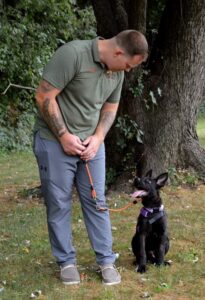FORT LIBERTY, NC., March 3, 2024 — He walks with a cane but wears a smile and shares his story of survival. Staff Sgt. Devin Fink is competing to be on Team Army this week for a chance to go to the 2024 Department of Defense Warrior Games in Orlando in June. “My why is that I have always wanted to serve, and I want to continue to serve, but I know I will medically retire,” said the 30-year-old married father of two. However, if I can continue to serve on Team Army, that’s full circle.”
Fink will medically retire after his latest injury that landed him at the Walter Reed Soldier Recovery Unit. “I ended up at Walter Reed coming off a deployment during the Afghanistan withdrawal in 2020-2021,” said Fink, who had three deployments overseas. “I was in an explosion and had internal organ damage. It was now my third TBI (Traumatic Brain Injury) too.”
He said this latest TBI was a game-changer. “This was a very large IED (Improvised Explosive Device) and I had to be hospitalized. I just wanted to get back to work.”
His only job in the Army since 2021 is to get better. The SRU has been a huge help to the active-duty Reserve Infantryman. “It would be extremely difficult if I had to recover on my own without the SRU,” said Fink, who’s received copious amounts of therapy at the SRU to get to where he is today. “When I first got back, I had a bad cognitive function deficit, my speech was impaired, and I had a bad brain delay. I have a lot of vestibular problems like vertigo, and my eyesight is weak, and Meniere’s disease, meaning I don’t hear very well.”
He’s learning to adapt, but Fink says he can’t even look at a computer screen without closing one eye. As if these issues weren’t enough, there’s something else added to the mix. “I also learned I have a brain tumor and brain scaring.”
Because he has a tumor, there is a pending surgery. He’s being proactive in his immediate recovery by thinking of the future. “My walking isn’t the best, so I got into volunteering at a nonprofit called Cover Six Canines, training dogs,” he said. They trained him to train his dog, but he then became a certified trainer and was able to help other Soldiers with their dogs, which he will continue to do in retirement.
“I never thought I would be training dogs; I’m used to kicking in doors, now I am playing with puppies,” he said with a laugh.
Fink took the adaptive sports route to recover and overcome, for which he is grateful. “I wouldn’t have outlets to have the camaraderie and team building like in the SRU.”
He said adaptive sports and events like Warrior Games are another great aspect of working with like-minded Soldiers, all in need of help they find from each other. His favorite adaptive sport is air rifle, something he is very familiar with from earlier days of competition. “I started in high school with an air rifle when I was in JROTC,” said Fink.
“When I learned they had that competition here that could be tailored to my disability, I was so interested! I had my chance at the Olympic trials as a young kid, but I blew that. But if I can make Team Army as a 30-year-old, that would be awesome.”
